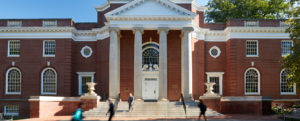In its sustained effort to control costs for students, the Board of Visitors of the University of Mary Washington accepted a recommendation for minimal cost increases in the next academic year. President Troy Paino’s proposal, which received unanimous approval, sought to address the increasing cost of serving students primarily through budget reductions and reallocations. Paino has spoken frequently to the campus community about the importance of controlling costs and ensuring that highly motivated students can attain a college education. This commitment, he says, is a fundamental responsibility of a public institution.

In the 2019-20 academic year, a Virginia student living in a UMW residence hall and subscribing to a campus dining plan will see an overall increase of only $556 or 2.4%. An out-of-state student’s tuition, room and board annual increase will be $1,048 or 2.7%. The cost for full-time commuter students will increase by the same dollar amount over the year as for residential students.
The BOV’s decision offers Virginia students stable tuition, while out of state students will experience only a 2% tuition increase. Further, there will be no increases in dining plans or UMW-owned residence hall rates. Students living in Eagle Landing or the William Street Apartments, which are owned by the UMW Foundation, will see housing cost increases of 2% and 5% respectively.
According to Paul Messplay, UMW’s vice president for Administration and Finance, “The University worked to partner with the commonwealth in a joint commitment to keep the cost of tuition as low as possible.” He said the fee increase is for the auxiliary fee, which is part of the university’s effort to align student charges more closely with the related programs and services, such as housing, dining, and other student auxiliary programs such as athletics, recreation and student clubs, organizations and activities.
During its meeting today, the UMW Board of Visitors also approved a fiscal year 2020 budget, which includes a substantial increase in financial aid for students. The $129 million FY20 budget represents only a 0.4% increase over the current University budget, with the bulk going not only to student financial aid but also state-directed salary increases. The bulk of that increase, according to Messplay, is student financial aid and state-directed salary increases for faculty and staff. Faculty will see a 3% jump in pay, and classified staff members will receive a 2.75% across-the-board raise with an additional pool of funds to support a 2.25% average merit increase for eligible classified employees.